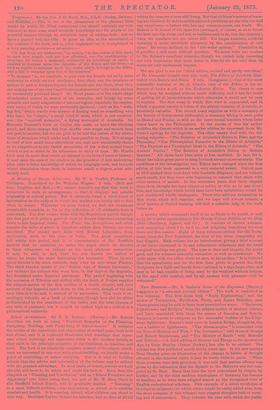We are glad to see the "third edition, revised and
partly rewritten," of Sir Alexander Grant's very able work, The Ethics of Aristotle, illus- trated with Essays and Notes. 2 vols. (Longmans.)—One of the most noticeable features of Sir A. Grant's view of the Ethics is his re- ference of books v.-vii. to the Eudemian Ethics. The theory is one which may be accepted without much difficulty, and it has the merit of getting rid of inconsistencies which otherwise it would not be easy to explain. The first essay in which this view is expounded, and in which a general survey is taken of the ethical remains of Aristotle, is peculiarly valuable. The second essay supplies us with a summary of the history of Greek moral philosophy, a summary taking in such poets as Hesiod and Pinder, as well as the more formal teachers whom later times knew as the Philosophers. In the course of this the author modifies the dissent which in an earlier edition he expressed from Mr. Grote's apology for the Sophists. The other essays deal with the fol- lowing subjects :—" The Relation of Aristotle's Ethics to Plato and the Platonists," "The Philosophical Formula in the Ethics of Aristotle," "The Physical and Theological Ideas in the Ethics of Aristotle." "The Ancient Stories," " The Relation of Aristotle's Ethics to Modern Systems." All these have been more or less modified. In fact, Sir A. Grant has taken great pains to keep his book abreast of recent study. The conditions of the investigation into Ethics have changed since the first edition of this book appeared to a very material extent. Oxford men in 1857 studied their text-book with laudable diligence, and not without much credit, but they were only beginning to connect that study with other systems of morals. In the seventeen years that have elapsed since then, thought has been almost as active in this as in any direc- tion, and knowledge which would then have been satisfactory would be now considered wholly inadequate. Those who address themselves to this study, which still remains, and we hope will always remain, a chief feature of Oxford training, will find a valuable help in the work before us.






































 Previous page
Previous page